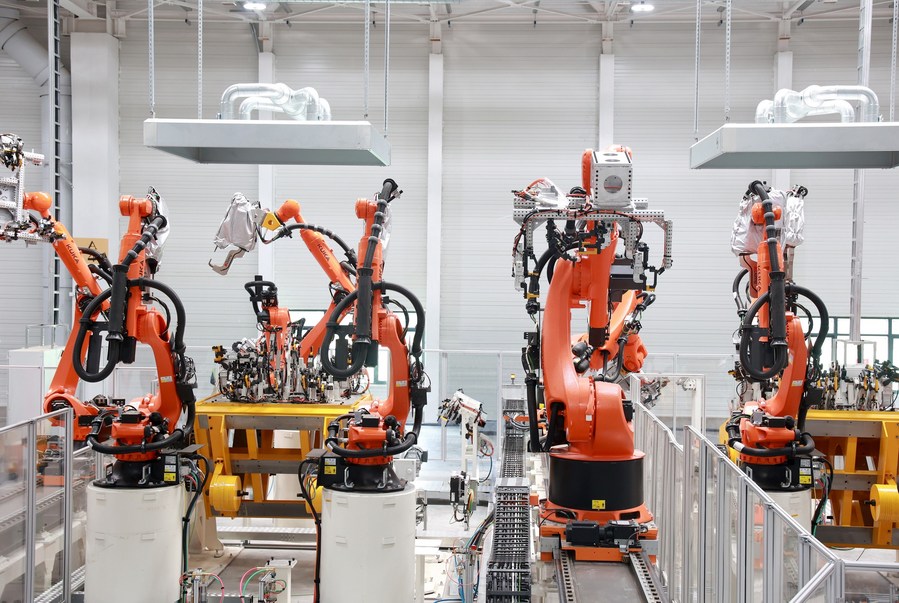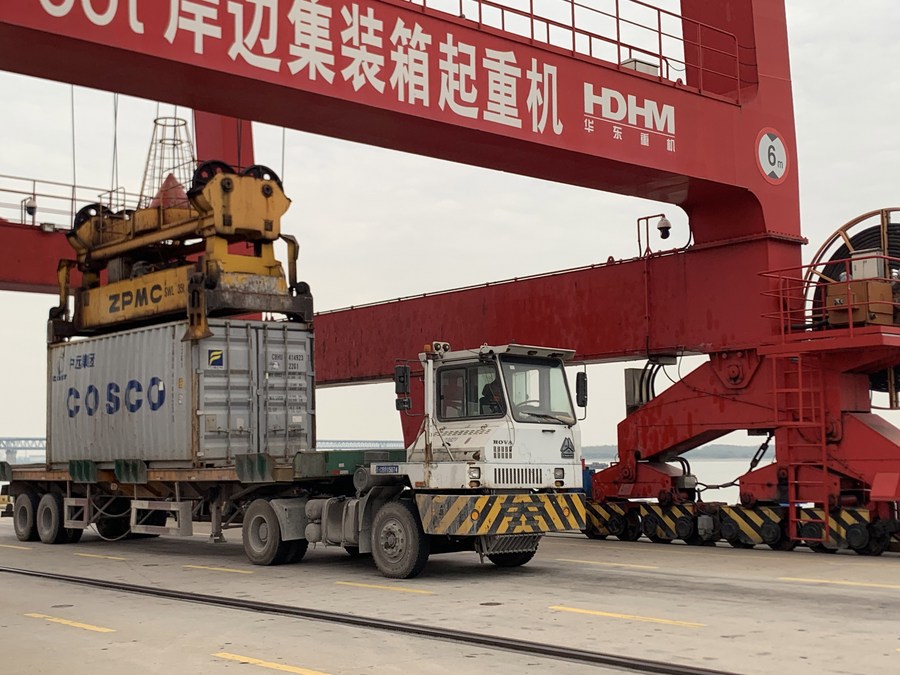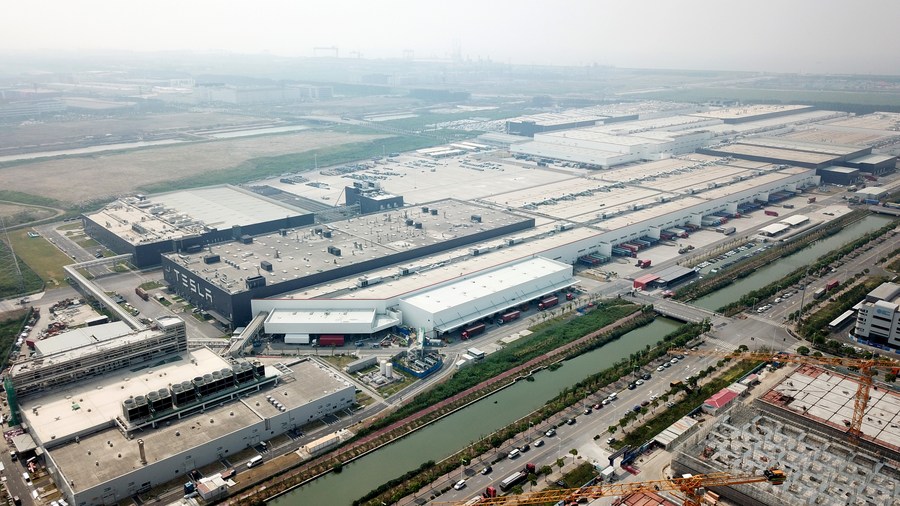Pilot FTZs gear up China's high-quality opening up
* In 2013, China's first pilot free trade zone (FTZ) was launched in Shanghai. In less than 10 years, the number of such zones has surged to 21.
* The speedy expansion of pilot FTZs demonstrates China's firm determination to open wider and share development opportunities with the rest of the world.
* By virtue of their significant role in boosting high-level opening up, pilot FTZs have become China's new high ground for financial innovation and reform.
HEFEI, Oct. 29 (Xinhua) -- In the Hefei area of the pilot free trade zone (FTZ) in east China's Anhui Province, Volkswagen Anhui MEB (Modular Electric Drive Matrix) plant construction is in full swing, with mass production of electric vehicles scheduled for 2023.
Several kilometers from the MEB plant, the Dazhong College, co-built by Volkswagen Group China, Volkswagen Anhui and Hefei University, has started running in the pilot FTZ. Inspired by Germany's vocational education system, the college is aimed at cultivating more skilled talent suiting the needs of enterprises.
Established in 2017 in the provincial capital Hefei, Volkswagen Anhui focuses on the research, development and manufacturing of new energy vehicles (NEVs) to tap into the world's largest NEV market.
"The pilot FTZ has provided not only many convenient services and support for our projects, but also help for foreign staff's daily lives in the zone, boosting the confidence of foreign enterprises," said Ronny Buechner, head of government relations of Volkswagen Anhui.

This photo taken on July 4, 2022 shows a workshop of the Volkswagen Anhui MEB (Modular Electric Drive Matrix) plant under construction in the Hefei area of the pilot free trade zone (FTZ) in east China's Anhui Province. (Xinhua)
Last month marked the second anniversary of the inauguration of the Anhui pilot FTZ. In the first half of this year, it generated foreign trade of 95.93 billion yuan (about 13.38 billion U.S. dollars), up 28.5 percent year on year, according to the administration office of China (Anhui) Pilot Free Trade Zone.
Pilot FTZs serve as "test fields" for China to advance reform and opening up. In 2013, China's first pilot FTZ was launched in Shanghai. In less than 10 years, the number of such zones has surged to 21, located in both coastal economic hubs like Guangdong and Zhejiang and inland regions such as Sichuan and Shaanxi.
The Shanghai pilot FTZ is now home to automaker Tesla's first Gigafactory outside the United States, which began construction in January 2019. In mid-August, the Gigafactory hit a new milestone with its 1 millionth vehicle produced.
The speedy expansion of pilot FTZs demonstrates China's firm determination to open wider and share development opportunities with the rest of the world.
FACILITATING TRADE, INVESTMENT
Loaded with rubber, a cargo ship arrived at the Wuhu Port in the Anhui pilot FTZ. According to the newly implemented "shipside delivery" mode, the containers, which had completed customs declaration in advance, were directly unloaded into vehicles and transported out of the port.
"In the past, the goods went to the storage yard first, and we had to go through a series of procedures to pick them up, which usually takes over a day," said Zhang Changgen, a logistics supplier for a local auto parts manufacturer.
Thanks to the new mode, one container can now be picked up within half an hour after the arrival, greatly reducing logistics time and fees, said Zhang.

A container is loaded onto a truck at an international container pier of the Wuhu Port in East China's Anhui Province, Sept. 27, 2022. (Photo by Yuan Juan/Xinhua)
"While attracting international talent, technologies, and enterprises, the pilot FTZs also provide a platform to test new business forms and models," said Chen Shiyi, principal of China (Anhui) Pilot Free Trade Zone Institute.
Based on regional advantages, pilot FTZs across China have been exploring new ways to improve the business environment and deepen opening up.
The pilot FTZ in south China's Guangxi Zhuang Autonomous Region has established a major cross-border e-commerce logistics channel for the Association of Southeast Asian Nations (ASEAN) and launched 10 air routes to countries including Indonesia, Thailand, and Malaysia, according to the regional department of commerce.
The continuous shortening of negative lists in pilot FTZs has given foreign investment wider market access. Since the first pilot FTZ negative list for foreign investment was implemented in 2013, the number of items on the list has been cut from 190 to 27 in 2021 after seven rounds of modifications, said Vice Commerce Minister Wang Shouwen in March.
On the same occasion, the vice minister hailed these zones' active role in promoting the stability of China's foreign trade and investment. In 2021, the actual utilization of foreign capital of the 21 pilot FTZs increased by 19 percent, 4.1 percentage points higher than the national level, he noted.
Meanwhile, the total import and export volume of 21 pilot FTZs hit 6.8 trillion yuan last year, accounting for 17.3 percent of China's total import and export volume, according to the ministry.
PROMOTING FINANCIAL INNOVATION
By virtue of their significant role in boosting high-level opening up, pilot FTZs have become China's new high ground for financial innovation and reform.

This aerial photo taken on Aug. 20, 2022 shows the Tesla Gigafactory in the Lingang new area of the China (Shanghai) Pilot Free Trade Zone in east China's Shanghai. (Xinhua/Jin Liwang)
The Shanghai pilot FTZ took the lead in introducing a slew of financial innovation measures, including enlarging cross-border use of RMB and establishing a free trade account system. The system has been introduced to pilot FTZs in Tianjin Municipality, Guangdong Province and other regions in China.
Over the past three years, more than 400 financial enterprises have settled in the Lingang new area of the Shanghai pilot FTZ, with an industrial investment fund system worth 283 billion yuan.
Earlier this year, the first batch of foreign banks set up their presence in the area, including United Overseas Bank (China) Limited (UOB China). The Bank has actively worked with its partners to develop innovative solutions in areas such as cross-border cash management, offshore trade, overseas fund investment and sustainable finance, said Peter Foo, president and CEO of UOB China.
"Financial opening up reflects China's deeper-level opening up on a bigger scale and wider range. We need to utilize the vanguard role of pilot FTZs to enhance systematic reform and promote the internationalization level of financial services," said Zheng Yi, a researcher with the China (Anhui) Pilot Free Trade Zone Institute.
(Video reporters: Cao Li, Lin Kai, Fu Yingting, Sun Qing, Chen Jie, You Zhixin, Wang Huan, Mao Pengfei, Zhu Wei; Video editors: Zhu Cong, Li Qin, Liu Xiaorui)


